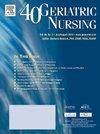急性护理中的早期识别和谵妄识别:一项质量改进倡议
IF 2.5
3区 医学
Q3 GERIATRICS & GERONTOLOGY
引用次数: 0
摘要
尽管使用了经过验证和可靠的工具,但在急性护理中,谵妄的识别仍然是一个挑战。这个以证据为基础的质量改进项目旨在通过增加使用混淆评估方法(CAM)工具的日常筛查来提高谵妄的识别。提高评估使用率和准确性的方法包括由经过专门培训的老年护士冠军(GNCs)进行针对性教育。在查房期间,GNCs进行床边评估,提供实时反馈,并侧重于内科-外科和遥测单位的非药物干预。所有65岁及以上的患者均被纳入。在三个月内,每日的CAM筛查增加了7.6%,包括CAM阳性结果从7.1%增加到8.5%——谵妄诊断的增加观察到额外的有利结果。该项目通过同伴指导和重点查房提高了知识的保留和非药物干预的强化。需要持续的培训和教育来增加对谵妄患者的识别。本文章由计算机程序翻译,如有差异,请以英文原文为准。
Early identification and delirium recognition in acute care: A quality improvement initiative
Recognition of delirium continues to be a challenge in acute care despite the use of validated and reliable tools. This evidence-based quality improvement project aimed to increase delirium recognition by increasing daily screening using the Confusion Assessment Method (CAM) tool. Methods to increase usage and accuracy of the assessment included targeted education by specially trained geriatric nurse champions (GNCs). During rounds, GNCs performed bedside assessment, provided real-time feedback, and focused on non-pharmacological interventions on medical-surgical and telemetry units. All patients 65 years of age and older were included. Daily screening of CAM assessment increased by 7.6 % over three months, including an increase in CAM positive results from 7.1 % to 8.5 %—additional favorable outcomes observed with an increase in delirium diagnosis. This project increased knowledge retention and reinforcement of non-pharmacological interventions through peer coaching and focused rounds. Continued training efforts and education are needed to increase identification of patients experiencing delirium.
求助全文
通过发布文献求助,成功后即可免费获取论文全文。
去求助
来源期刊

Geriatric Nursing
医学-护理
CiteScore
3.80
自引率
7.40%
发文量
257
审稿时长
>12 weeks
期刊介绍:
Geriatric Nursing is a comprehensive source for clinical information and management advice relating to the care of older adults. The journal''s peer-reviewed articles report the latest developments in the management of acute and chronic disorders and provide practical advice on care of older adults across the long term continuum. Geriatric Nursing addresses current issues related to drugs, advance directives, staff development and management, legal issues, client and caregiver education, infection control, and other topics. The journal is written specifically for nurses and nurse practitioners who work with older adults in any care setting.
 求助内容:
求助内容: 应助结果提醒方式:
应助结果提醒方式:


